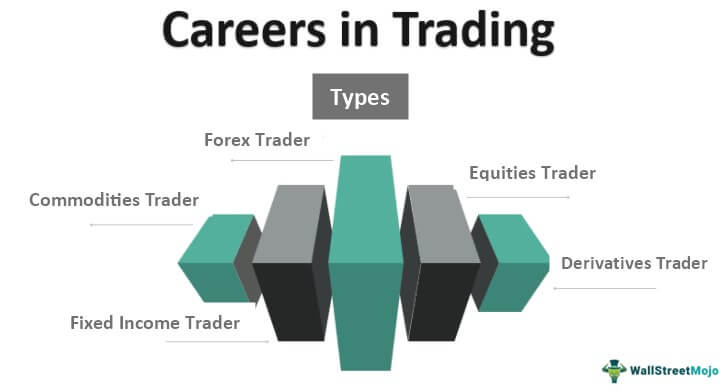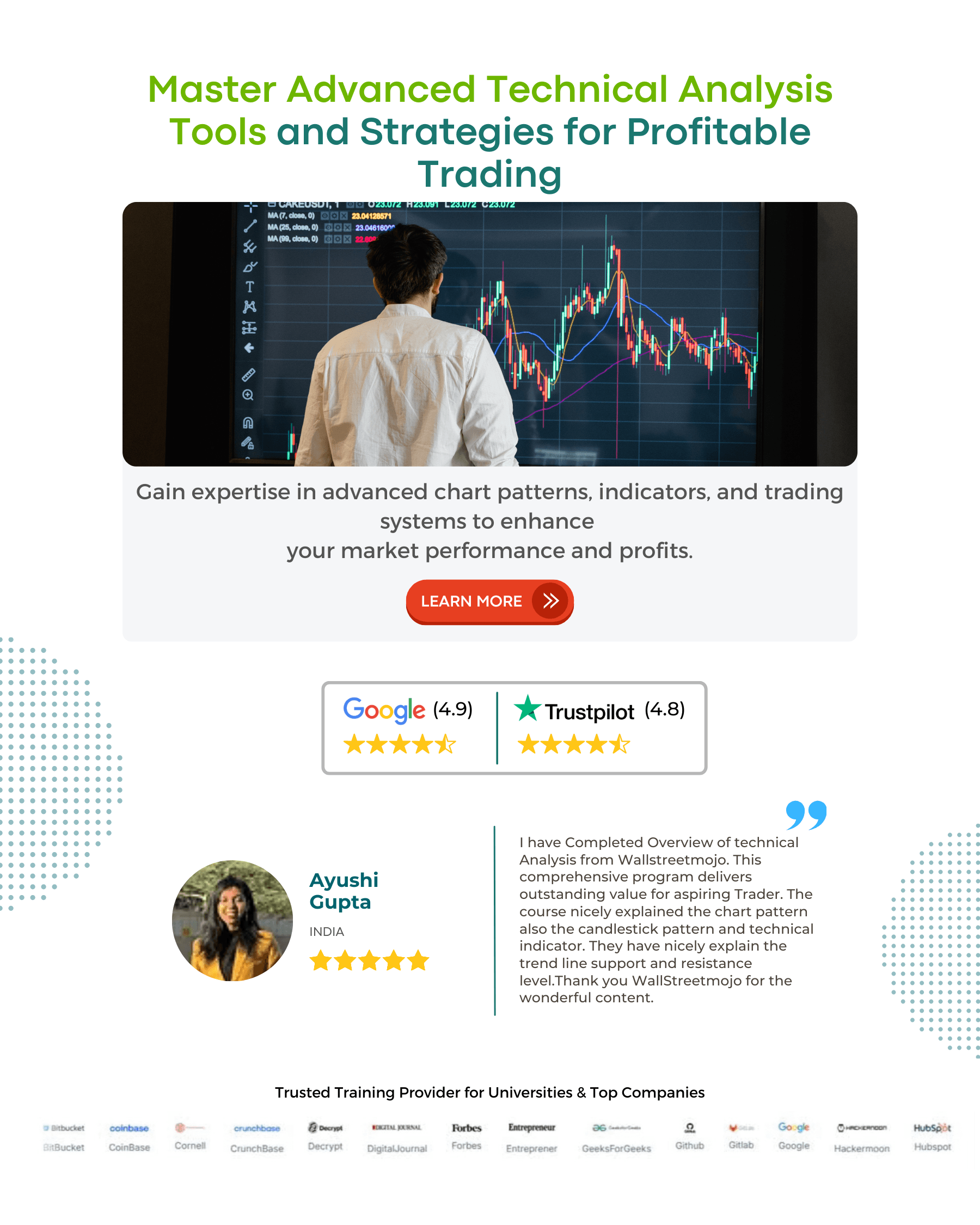Table Of Contents
Careers in Trading Meaning
To start a career in trading, one is required to get the required degree from a reputed university, after which the person can build up his career by working in various organizations like insurance companies, asset management companies, private equity firms, mutual fund companies, and the other firms involved in providing the financial services.
Getting a degree in finance and accounts is just a beginning step. The next major step involves finding the right field in the finance sector for your career and exploring options that interest you and give you good financial stability. Often finance degree holders want to explore job opportunities in the field. Trading is a field that has many job avenues to venture into, and if the field of trading suits your interest, then you are at the right place. In this article, we will elaborate on the different types of careers in trading that a financial graduate can get.
To establish your career in trading, you need to understand what trading is, the nitty-gritty involved, and how it is done.
Table of contents
What is Trading on Wall Street?
Trade refers to buying and selling goods to gain money. Trading not only earns you money but also serves the purpose of providing services to various consumers. Trading plays an important role in the global economy by creating liquidity in the financial market. Trading is the chief source of profits for investment banks, and it is also done by many other institutions like hedge funds, commodities companies, etc. Trading, generally, uses scientific methods and extensive research to predict the future of the financial market.
Types of Trading
There are three major ways in which trading can be done:
#1 - Market Making
Market making is when a trader buys a product or asset from a buyer and then sells the product to a seller at high prices, thus making his profit in the deal. This gain in profit is called market making. To be a good market maker, you must observe the market closely and complete both sides of the deal before the asset price goes up or dips down.
#2 - Agency Trading
In agency trading, you perform trading for your client. An agency trader has a list of clients who contact him for buying assets at a specified amount, and the agency trader executes the request. Agency trading involves many restrictions as compared to other ways of trading.
#3 - Proprietary Trading
Proprietary trading is the riskiest of all types of trading, but it is also the most profitable way of trading. Prop traders work according to the theories and assumptions about the working of the market and open positions according to it. If they are correct, they make a large amount of money; otherwise, they lose it. Most investment banks have dedicated desks for prop trading, and we even have many firms dedicated to propping trading.
Top 5 Types of Trading Careers

#1 - Equities Trader
- Here the traders trade on publicly listed stocks and shares.
- Generally, traders look for large short-term gains, and Equities do not provide such opportunities.
- This is the reason Equity Trading has lost much of its popularity.
- However, please note that Equity Trading is the least risky of all trading areas.
Equity Trader Career
- Below is the job opening for Equity Trader.
- This job is for an Asset Management firm and involves executing trading orders given by Portfolio Managers.
- You should have a good understanding of the Equity Markets and should be able to determine market sentiments using your research, valuations, and analysis.

source: efinancialcareers.co.uk
#2 - Fixed Income Trader
- Trade on bonds, government securities, and fixed-income assets
- Fixed Income Asset means any assets that provide fixed returns over some time.
- These can be further subdivided into Government, Mortgage, Municipal, Corporate, etc.
- Fixed Income trading tends to be riskier than Equities as Fixed income has been extended to exotic instruments like CDO (Collateralized debt obligations). CDOs were the main reason for the 2008 crisis.
Fixed Income Trading Career
- Below is a snapshot of the Fixed Income Trading Requirement.
- You are expected to have a sound knowledge of the Fixed Income Market.

source: efinancialcareers.co.uk
#3 - Forex Trader
- This includes Trading on Currency Movements and fluctuations
- Generally, forex traders trade on currency pairs - USD/INR, EUR/USD, etc.
- Trading calls depend on country performances, GDP, macroeconomic outlook, and how the currency is going to perform in the future.
- Trading calls are taken depending upon their Depreciation/Appreciation Potential.
Forex Trading Career
- Below is a snapshot of Forex Trading Job.
- Forex Traders are responsible for executing FX transactions.
- Their primary role includes monitoring Total Forex exposure, identifying hedging opportunities, short-term funding, rebalancing requirements, etc.
- They are expected to stay most up-to-date with Macro trends.

source: efinancialcareers.co.uk
#4 - Commodities Trader
- This includes Trading on Crude, Gold, Metals, etc.
- These include almost every tangible natural asset like Oil, Copper, Gold, Wheat, Corn, etc.
- Commodities are usually traded in futures (meaning you can exit before maturity).
Commodities Trader Career
- Below is a snapshot of the Commodity Trading career profile.
- Commodity traders are expected to keep abreast of the latest in the commodities market.
- We should be able to track the commodities and form views on the commodity pricing forecasts.

source: efinancialcareers.co.uk
#5 - Derivatives Trader
- This includes trading with Options, Futures, etc.
- Derivatives are favorite among traders due to leveraged bets that you can make as well as lower capital requirements.
- It also tends to be the riskiest of the trading styles.
Derivatives Trader
- Below is a snapshot of Derivatives Equity Option Trader.
- Apart from taking trading calls, it is also important to manage risk here.
- Job includes trading with a team of brokers and screen traders to develop optimized equity strategies.

source: efinancialcareers.co.uk
Careers in Trading - Pre-Requisites
To make a career in trading, the first and foremost step is to get a degree from a reputed university and, after that, pursue an internship at any commercial bank or hedge fund to get the nitty-gritty of the trade and have hands-on experience. Being a graduate is sufficient for getting a trading job, but with the growing competition, you will be a much-preferred candidate with financial degrees like CPA, CFA, and MBA. Since trading is all about math and statistics, candidates who have done postgraduate or doctorate in mathematical and statistical fields. In the USA, it is compulsory to clear Series 7 and Series 63 exams to be a stockbroker.
In any career in trading, one begins as an intern in any financial organization and then moves up to the level of an assistant trader and then subsequently to the position of a senior trader. It is observed that many experienced traders start their own companies after gaining considerable experience.
Where to Look for a Career in Trading?
Now that you have important information about a career in trading, the next question is where to look for a trading job. You can pursue your career as a trader by working with various organizations like investment banks, asset management companies, hedge funds, and other financial firms. As a trader at an investment or commercial bank, you focus on earning profits by providing liquidity for your clients. Whereas, as a trader working in an asset management company, you need to search for the best prices of the financial tools which are part of your client's portfolio. On the other hand, in a hedge fund, you will work as a proprietary trader and earn profits from the changing trends of the financial market.
Buy-Side
The buy-side of a trading career involves working with various institutions like commercial banks, mutual fund companies, hedge fund companies, pension fund companies, and insurance companies, which tend to buy financial tools to serve the purpose of money management.
A good buy-side analyst always invests in the financial tools that tend to meet his client's expectations.
Under the categories of buy-side, there are many financial institutions one can choose from. For example:
- Insurance Companies
- Pension Funds
- Hedge Funds
- Venture Capital
- Private Equity
- Mutual Funds
- Asset Management
You can work as a buy-side analyst at institutions like mutual funds, private equity, and hedge funds, and asset management organizations. You can also work as a portfolio manager where you would buy and sell financial tools for your clients. You can also counsel senior traders on whether to buy or sell financial security or not who would perform the task. At buy-side firms, there are restrictions compared to other firms in the role of a trader, as you would mostly follow the orders of a portfolio manager. Still, you can also exercise control by making the important decision of the perfect time and the best price to buy a financial instrument. However, a career in trading at an asset management company can be less demanding and competitive than jobs at other institutions.
Sell-Side
Sell-side usually involves working with institutions like investment banks, asset management companies, and hedge fund companies. A sell-side analyst is the one who prepares an equity research report.
to advise whether to buy, sell, or hold the financial tools and thus counsels the clients and investors.
Under the categories of sell-side, there are many financial institutions one can choose from. For example:
- Investment Banking
- Sell-side Research
- Trading at banks
Conclusion
We have thoroughly explained the details of careers in Trading that you can get as a degree holder in any finance. If reading this has made you excited and motivated, then a trading career on Wall Street is the right choice for your career. Trading jobs exist at almost all financial companies in the industry, and you have to choose the best suitable role based on your potential. You need to research and talk to various people to find the right type of trading career for yourself and perform to get that job. Different careers in trading require different skills, and you should enter the field after considering the talent required. It would be best if you always looked forward to your long-term interest to retire in style with sufficient money in your bank account.
For professional-grade stock and crypto charts, we recommend TradingView – one of the most trusted platforms among traders.
Disclosure: This article contains affiliate links. If you sign up through these links, we may earn a small commission at no extra cost to you.
Recommended Articles
This has been a guide to careers in trading. Here we discuss the top 5 trading careers on Wall Street, including Equity Trader, Fixed Income Trader, Commodities Trader, Forex Trader, and Derivatives Trader. You may also learn more about Trading from the below articles -

